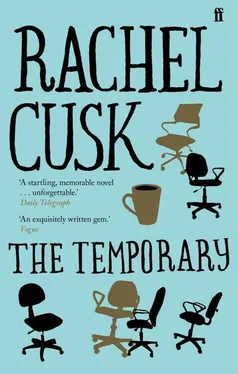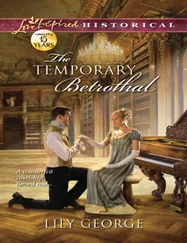Rachel Cusk - The Temporary
Здесь есть возможность читать онлайн «Rachel Cusk - The Temporary» весь текст электронной книги совершенно бесплатно (целиком полную версию без сокращений). В некоторых случаях можно слушать аудио, скачать через торрент в формате fb2 и присутствует краткое содержание. Год выпуска: 2013, Издательство: Faber & Faber, Жанр: Современная проза, на английском языке. Описание произведения, (предисловие) а так же отзывы посетителей доступны на портале библиотеки ЛибКат.
- Название:The Temporary
- Автор:
- Издательство:Faber & Faber
- Жанр:
- Год:2013
- ISBN:нет данных
- Рейтинг книги:5 / 5. Голосов: 1
-
Избранное:Добавить в избранное
- Отзывы:
-
Ваша оценка:
- 100
- 1
- 2
- 3
- 4
- 5
The Temporary: краткое содержание, описание и аннотация
Предлагаем к чтению аннотацию, описание, краткое содержание или предисловие (зависит от того, что написал сам автор книги «The Temporary»). Если вы не нашли необходимую информацию о книге — напишите в комментариях, мы постараемся отыскать её.
The Temporary — читать онлайн бесплатно полную книгу (весь текст) целиком
Ниже представлен текст книги, разбитый по страницам. Система сохранения места последней прочитанной страницы, позволяет с удобством читать онлайн бесплатно книгу «The Temporary», без необходимости каждый раз заново искать на чём Вы остановились. Поставьте закладку, и сможете в любой момент перейти на страницу, на которой закончили чтение.
Интервал:
Закладка:
He went to the sitting-room and looked at the answering machine. There was a message on it, and he regarded it for a moment with foreboding as he realized it might be Francine, saying that she couldn’t make it after all. He pressed the button and heard Stephen’s voice saying something clipped, which sounded like ‘let’s see’ — probably ‘it’s me’, Ralph thought — then a kind of long sigh and the clamour of the phone being put down. Everything was fine, then.
*
Some time later, Ralph lay in the bath. Next door, the risotto lay in the oven, warming. He had been too frightened to taste it, but he knew there was something wrong. At first it had been too liquid, and he had added more rice, in his enthusiasm rendering the whole thing rather glutinous, its parts indistinguishable. More worrying, however, was the peculiar smell it emanated, which Ralph had attempted to track down to some infestation of the fridge or kitchen cupboards but which finally he had had to admit was the perfume of his offering to Francine. He had attempted to identify it — it was a bitter, floury smell — from the parade of ingredients from which he had assembled the dish, but it had resembled none of them. In the end he had tried to disguise it with the addition of stronger presences which he had hoped would somehow crowd it out. The spices he had added had succeeded only in transforming its colour, against which he had had no complaint in the first place, and he had been forced to resign himself and place the muddy, odorous mass in a large dish in the oven.
The incident had burdened him with a sense of indifference which was prolonging his lazy, lukewarm immersion dangerously close to the half-hour zone he had cordoned off for last-minute preparations. His bath had thus far been a nihilistic event, an exercise in detachment involving the objective scrutiny and contemptuous dismissal of each immobile, ghoulish part of his body. In the day-dreams with which he had readied himself for Francine’s arrival, the bath had been a hearty, foamy affair, a steamy and fragrant series of whale-like dives and merry purgings, from which he would emerge tousled and shining to spray and slap himself with pungent substances. Only enforced contemplation of the inescapable and fast-approaching evening succeeded finally in urging him into a cursory scrubbing, and he rose from it dripping and slightly more cheerful, thinking of how he and Francine could laugh together at his risotto and how all he had to do was relax. His hair didn’t look so bad in the bathroom mirror either, and after one or two different attempts his clothes seemed all right too. He went back to confront the hall mirror, and found that he had improved himself.
In a moment of largesse, filled with the growing sense of his own urbanity, he decided to open a bottle of wine and drink some of it, just to show Francine that he knew how to be sociable with himself. She wasn’t due to arrive for half an hour yet, taking into account the fifteen minutes by which he assumed she would be late, whether by accident or design. He opened the oven door and peered in through the crack. His oven had a light in it which gave the risotto the appearance of a museum exhibit, a dish of planetary matter brought back by astronauts, or a porridgy alien captured and held hostage. He slammed the door shut and opened one of the bottles of red wine he had bought at the delicatessen. Sitting at the kitchen table with it, he realized that he hadn’t spent an evening — well, this kind of evening, anyway — with a woman for a long time. He had thought that he had, of course, but the quite suffocating excitement and fear with which he currently trembled explained to him why he had felt so awkward on those occasions, almost as if he didn’t care what happened during them. He had cared in the hours before a liaison, going through the imaginary evening like a diligent tourist would a guidebook, marking every highlight; and then registering his disappointment on arrival at each reality with equal thoroughness. This time, he had tried not to think about anything beyond the moment of Francine’s arrival. His unfamiliarity with her rendered his conjectures flimsy and unenjoyable, and it was a testament to her superiority, he thought, that the idea of imagining her in unplayed scenes appeared all at once rather lewd and inappropriate. He had always thought that love, or even infatuation, took him a long time to make, an old-fashioned business which would eventually produce a high-quality emotion. If he was honest about it, though, Belinda was the only person he had really loved, and when he first met her he had instantly felt much the same as he was feeling now. The disbelief at the beginning that she had agreed to go out with him, gradually eroded by the fact of her continuing presence; really, it had been the most amazing thing. He had felt disbelief at the end, too, but events had made it true, a sickening succession of votes cast against him until he had had to concede that he had lost.
His glass was empty and he poured more wine into it. He never saw Belinda now, hadn’t seen her for two years actually. She had tried to be his friend, he supposed, but he had messed it up, unable to stand the sight or sound of her, really, everything she did without him hurting him. She had said that had upset her more than anything else. It made him laugh. He laughed now, the sound ghostly in the empty flat. At least she didn’t see Stephen either, pretty much the only good thing to have come out of that time. Not that Stephen cared, of course, but it would have made Ralph’s main achievement of the last two years — never thinking about Belinda — that much more difficult. He was thinking about her now, though, he could feel himself doing it. He drained his glass and held the bottle once more at its rim. His hand shook, and the two glass lips chattered against each other loudly. At the sound, a quite unstoppable feeling of fear began to steal over him. He had worked so hard to compress all of that, to hammer it down and keep it somewhere out of sight, but here it was springing up in all its large, noisy mockery, and for a moment he couldn’t remember how he had ever managed to crush and contain it. He tried to think of something else — Francine, that was right — but everything around him suddenly seemed so foreign and far away that he could not place himself within it. A great shiver shook him as spools of memory began to unreel messily across his thoughts, scenes hurtling by in the gallop towards the blackest part of himself, the only thing he ever thought of as true and yet it was so fantastic, so easy to deny — as they had both denied it! — that he thought he had cut it off for ever, that he would never go there again. He clenched his fists on the table and felt something burn at his eyes, so hot and dry that it seemed wrung from the tight and boiling ball of his heart. His misery struggled and was born; and when it did so everything seemed to stop, to accept the impossibility of going on, as if he had some place in the world where he reigned, a small place where he could say the sun wouldn’t rise tomorrow if he didn’t want it to.
The doorbell rang, and Ralph jumped in reflex as the loud voltage pealed through him. Its alarm dispersed slowly into silence, and it was a while before it reconstituted itself in his thoughts. Francine was at the door. Everything seemed foggy and submerged, and he stood up heavily, realizing that he felt quite drunk. He set off down the hall, his footsteps loud as earthquakes in his ears.
Five
Francine stood outside Ralph’s front door and used the delay between her ringing the bell and his answering it to make some last-minute adjustments to her appearance. She unbuttoned the jacket she had been forced by cold to fasten during the walk from the Tube station — she had compared the two styles several times during the day, before the large mirror in the ladies’, and had concluded that the open front was more flattering — and inspected the blouse beneath to make sure it had not been deranged by its period of enclosure. It was slightly flattened and she plucked at it expertly until it hung in a more becoming fashion, casting as she did so a keen eye over the glimmering vista of her stockinged legs. They appeared undamaged by their journey, but she craned her head and twisted first one leg and then the other to afford her a view from behind, just in case. She had debated bringing a set of different clothes in a bag to work so as to change into them at the end of the day and thus appear more casual, but when she considered that the tailored suits and high-heeled shoes she wore to the office revealed her to her best advantage, the necessity of travelling directly from the City to Ralph’s flat appeared to provide the perfect excuse for remaining in them.
Читать дальшеИнтервал:
Закладка:
Похожие книги на «The Temporary»
Представляем Вашему вниманию похожие книги на «The Temporary» списком для выбора. Мы отобрали схожую по названию и смыслу литературу в надежде предоставить читателям больше вариантов отыскать новые, интересные, ещё непрочитанные произведения.
Обсуждение, отзывы о книге «The Temporary» и просто собственные мнения читателей. Оставьте ваши комментарии, напишите, что Вы думаете о произведении, его смысле или главных героях. Укажите что конкретно понравилось, а что нет, и почему Вы так считаете.












